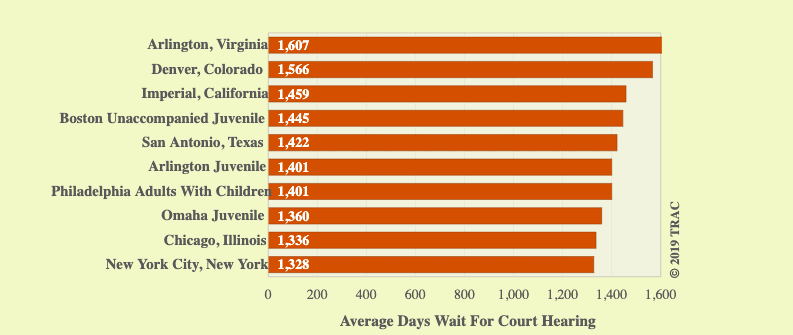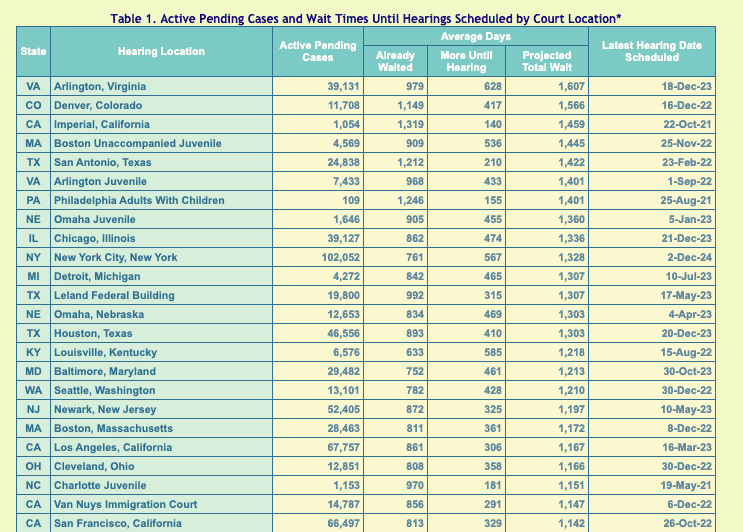
FOR TENS OF THOUSANDS of New England immigrants, the long wait time for a day before an immigration judge has gone from bad to worse.
For unaccompanied minors, or young immigrants who are in the US without a parent, the delay has climbed to an average of 1,445 days, or almost four years, according to a recent report from the Transactional Records Access Clearinghouse (TRAC), a research center at Syracuse University. Immigrants in other categories, such as those waiting for green cards, asylum application, or special statuses are similarly dealing with backlogs of up to four years.
The Syracuse research center says Trump administration efforts have failed to address a worsening backlog of immigration court cases. Overcrowded dockets are lengthening wait times beyond four years for the more than 1 million people waiting for their hearings to be scheduled. A little over 33,000 of those are in the Bay State.
The office responsible for dealing with the bottleneck, the Executive Office for Immigration Review, the Department of Justice office that oversees all immigration courts, did not respond to a request for comment on the report.
The backlog has increased each year since President Trump took office, and is nearly double where it stood at the start of his administration, when 542,411 cases were pending.
For noncitizens in Massachusetts, the backlog can mean waiting longer for work authorization or to obtain legal status.
“Four years of uncertainty leads to stress, fear and anxiety for our clients, many of whom fled harm and persecution in their home countries and need stability and security to heal,” said Sarah Sherman-Stokes, associate director of the Immigrants’ Rights and Human Trafficking Program at Boston University School of Law, in a statement.

Average days for immigration court hearing. (TRAC, Syracuse University)
“In terms of other consequences, a delayed hearing may mean that lawful status (even work authorization) takes longer to obtain –– which means that in order to survive, people work in jobs under the table, where conditions are unsafe and exploitation is common,” Sherman-Stokes said. “They are paid less and at greater risk, making it even harder to support themselves and their families.“
Mahsa Khanbabai, the New England chapter chair of the American Immigration Lawyers Association, said immigrants are worried about their job stability, as are their bosses, who need clarity.
“Employers are naturally worried when they hear about an employee needing a visa or work authorization,” she said. “The delays in obtaining work authorization affects businesses, and long wait times at the courts create complications for individuals as they renew their work authorizations.”
Massachusetts attorney Eliana Nader said many of her clients have children or spouses in their home countries. “If the client was granted their case in court, they could then petition for their children or spouse to come to the United States,” she said. “Because of the huge backlog, they are waiting for years to potentially petition for their child and be reunited. This is causing so many split families for so long.”
Boston Immigration’s Court serves Maine, New Hampshire, Vermont, Massachusetts, and Rhode Island.
The Office for Immigration Review has tried hiring new judges and imposing production quotas, but the caseloads for judges continue to grow. Judges in the region currently have an average of more than 3,000 cases pending.
Two weeks ago, the Executive Office for Immigration Review announced the agency had topped 275,000 case completions for the last fiscal year, an increase of 80,000 from last year. The Justice Department says it has hired more judges, with the total pegged at 442 as of September, but that is mainly in response to the higher volume of immigration cases filed by the Department of Homeland Security a consequence of the ongoing border crisis.

Chart of pending cases and wait times in immigration courts. (TRAC, Syracuse University)
In the announcement, the director of the Executive Office for Immigration Review, James McHenry, placed the blame for surging caseloads on congressional inaction on the border crisis. “While EOIR is doing an unprecedented job adjudicating cases fairly and expeditiously, the nearly one million case backlog will continue to grow unless Congress acts to address the crisis at the border.”
Other regions are facing similar problems. In New York City, hearings are being scheduled five years out, for December 2024.
The post Over 33,000 immigrants waiting for day in Boston’s immigration court appeared first on CommonWealth Magazine.